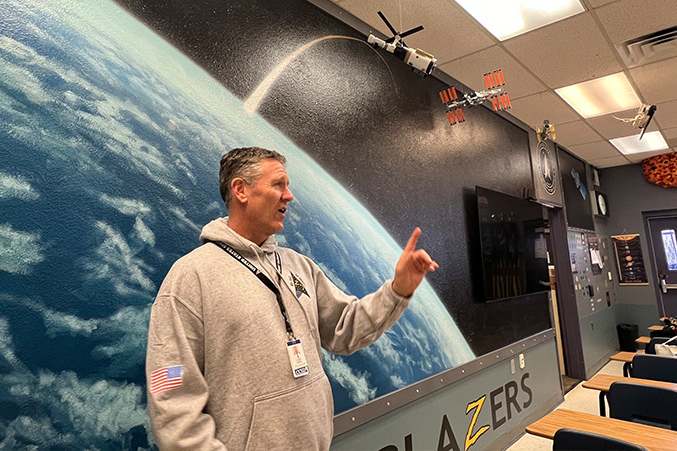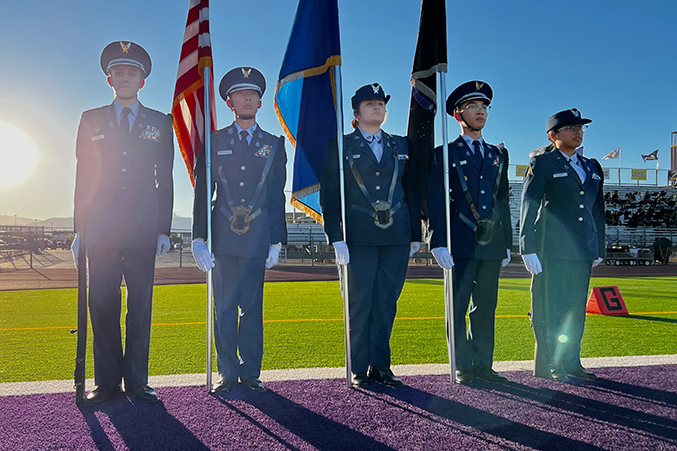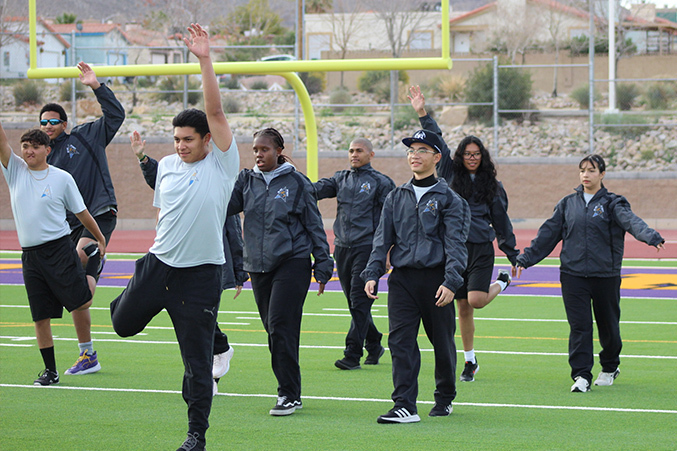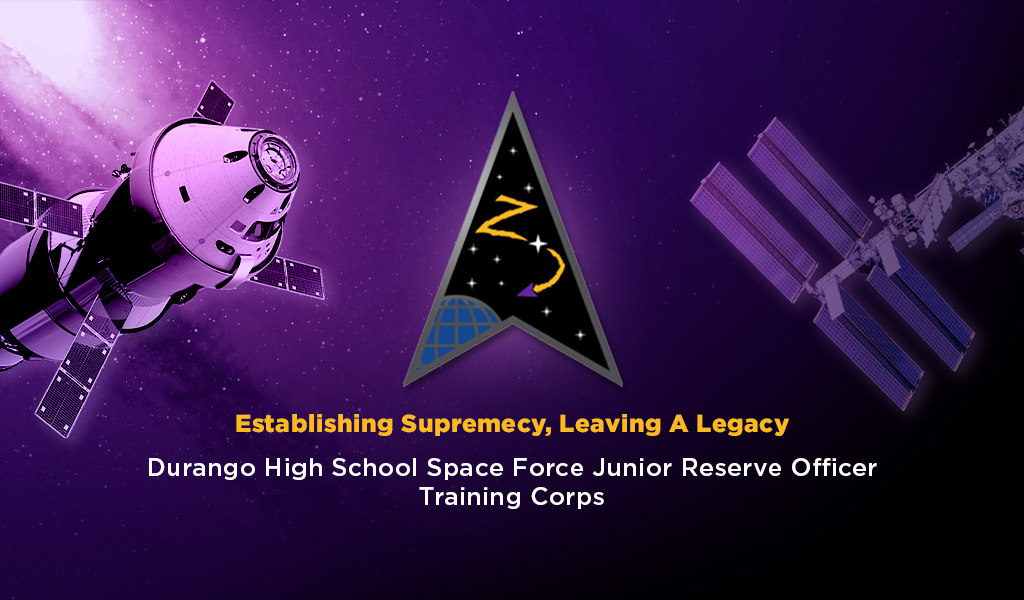Aerospace Science, Leadership, and Physical Training
The Space Force Junior ROTC program at Durango High School helps cadets grow into informed, capable citizens prepared for leadership in any path they pursue. The curriculum blends aerospace science, STEM, leadership education, drill, and physical training to build knowledge, discipline, and real-world skills.
Cadets don’t just sit in a classroom, they apply what they learn through real-world problem-solving, competitions, and student-led training. Whether they choose to enlist, pursue college, or enter the workforce, SFJROTC prepares them for success.

How the Program Works
Durango’s SFJROTC operates as a student-led unit, where cadets take on leadership roles to manage training, scheduling, events, and operations. The program blends aerospace science coursework, leadership education, and hands-on training to help cadets build confidence and real-world skills.
- Study aerospace science topics such as aviation history, space exploration, and flight mechanics.
- Train in leadership development and teamwork through structured activities.
- Participate in physical fitness and wellness training as part of their curriculum.
- Compete in regional and national competitions, including Drill Team, CyberPatriot, and StellarXplorers.
- Take part in community service initiatives, school events, and outreach programs.
- Earn leadership positions, mentor younger cadets, and plan activities that reinforce discipline, responsibility, and teamwork.
Cadet Chain of Command
Leadership is the foundation of SFJROTC. The Cadet Chain of Command provides structure, allowing students to step into progressive leadership roles as they advance.
Each cadet learns responsibility by taking charge of training, mentoring, and program operations. Leadership is not just taught, it is earned through experience.
VIEW CADET CHAIN OF COMMAND
Aerospace Science (40% of Curriculum)
Cadets gain a strong foundation in aerospace science through classroom instruction, research, and project-based learning. The curriculum is designed to build technical knowledge and introduce students to aerospace careers and real-world applications. Cadets study:
- The history and impact of aviation and space exploration
- Principles of flight, rocketry, and satellite systems
- Navigation, astronomy, and space environment science
- Emerging aerospace technologies and cybersecurity
- The evolving role of the U.S. Space Force in national defense
Leadership Education (20% of Curriculum)
Leadership training focuses on character building, problem-solving, and team management. Cadets apply these leadership skills daily by planning activities, managing logistics, and mentoring newer cadets. Cadets receive instruction in:
- Personal responsibility and ethical decision-making
- Team leadership and communication skills
- Public speaking and strategic thinking
- Military traditions and structure (without requiring enlistment)
- Time management, goal setting, and self-discipline


Physical Training & Wellness (20% of Curriculum)
Physical fitness is an essential part of SFJROTC, designed to promote discipline, resilience, and teamwork. This training prepares cadets for competition teams while also reinforcing mental toughness and personal wellness. Cadets participate in:
- Weekly physical training (PT) sessions focusing on endurance, strength, and flexibility.
- Fitness assessments, including push-ups, sit-ups, and mile runs.
- Competitive physical challenges that build motivation and teamwork.
- Wellness education that reinforces lifelong fitness habits.
Drill & Ceremonies (20% of Curriculum)
Drill provides cadets with a structured, hands-on application of their leadership education. It reinforces precision, teamwork, and attention to detail. Cadets participate in:
- Individual and group drill formations
- Ceremonial practices and public performances
- Command voice development and drill leadership
- Marching, saluting, and uniform inspection routines

Course Progression by Year
SFJROTC is a four-year elective program, but students can join at any grade level and will begin at the appropriate stage. At every level, cadets apply what they learn through real-world projects, competitions, and leadership exercises.
First Year Cadets (Military Science I)
- Aerospace Science: Milestones in Aviation History
- Leadership Education: Traditions of Leadership
- Focus on foundational aerospace topics, citizenship, and wellness
- Introduction to drill, team building, and community involvement
Second-Year Cadets (Military Science II)
- Aerospace Science: Exploring Space: The High Frontier
- Leadership Education: Communication, Awareness, and Leadership
- Focus on space science and communication skills
- Cadets begin to take on team roles and prepare for advanced responsibilities
Third Year Cadets (Military Science III / Military Science III Honors)
- Non-Honors: Aerospace History / Life Skills and Career Opportunities
- Honors: Exploring Space II / Life Skills and Career Opportunities
- Cadets lead peer teams, help train new cadets, and manage classroom and event operations
- Exploration of careers, public speaking, and global awareness
Fourth Year Cadets (Military Science IV / Military Science IV Honors)
- Non-Honors: Cultural Studies / Fundamentals of Management
- Honors: Space Mission Analysis and Design / Fundamentals of Management
- Capstone year for cadets in leadership
- Responsibilities include mentoring, managing unit operations, and leading long-term projects
Specialized Training & Competitive Teams
Beyond classroom learning, cadets apply their skills in specialized competitions and extracurricular activities such as:
- CyberPatriot: A national cybersecurity competition.
- StellarXplorers: A space science and engineering competition.
- JLAB (JROTC Leadership & Academic Bowl): A national academic and leadership challenge.
- Drill Team: Competitive precision marching and discipline training.
- Color Guard: A ceremonial team performing at events and ceremonies.
- Physical Fitness Team: A specialized training program for endurance and strength competitions.
Career and Technical Education (CTE) Credit
SFJROTC is part of Nevada’s Career and Technical Education (CTE) program. Cadets enrolled in this program may be eligible to earn CTE College Credit, which can apply toward certain degrees or certificates at participating two-year colleges in Nevada, such as CSN, TMCC, WNC, and GBC.
To qualify for CTE College Credit, students must:
- Complete the full SFJROTC course sequence
- Earn a 3.0 GPA or higher in the SFJROTC courses
- Pass the state end-of-program technical assessment
- Pass the state workplace readiness skills assessment
There is no cost for this credit, and it must be requested within three years of high school graduation.

